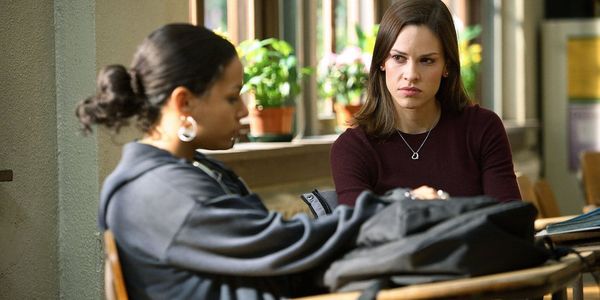Eye For Film >> Movies >> Freedom Writers (2007) Film Review
Freedom Writers
Reviewed by: Angus Wolfe Murray

You may think you have been here before (Dangerous Minds, Stand & Deliver), but you haven’t. As every good teacher says, “We are all individuals.” Same with movies, based on real events, about good teachers in bad schools, who make a difference and change lives.
The adjectives come ready packed: “heartwarming,” “uplifting,” “courageous,” “inspiring.” Quite soon, you will think that Erin Gruwell’s story should be animated by Pixar and distributed to primary schools throughout the country, so that inner city kids don’t feel alienated from the educational system – Brownie points all round.

Freedom Writers may be like this – or not (“Stop your cheer leading, Erin,” an older, more experienced male teacher snaps at her. “You are ridiculous”) – but what it isn’t is an excuse to feel better about failure. Erin may have fought the authorities for the sake of her class in Long Beach, California, two years after the Rodney King riots, but she is an unlikely heroine in the front line of a prejudicial war against interracial hostility that continually claims lives on the street.
“I hate white people,” Eva (April Lee Hernandez) says, because of how the police have treated her family.
“To get respect, you have to give it,” Erin tells her disruptive, antagonistic, violent, multiethnic, teenage pupils. They hardly bother to respond.
Where the film succeeds beyond expectation is in its depiction of the kids and how the tribal lines are drawn in areas of this city where drive-bys are as common as parking tickets and the teachers don’t hand out books in class anymore because they know they’ll come back in pieces, if they come back at all. This is that place down the line called No Hope, where surviving until the age of 17 is an achievement. As for college, exam results, or good grades, don’t even think about it. Try to maintain discipline, Erin is told by her superior (Imelda Staunton), that’s all you can do.
Her naivety protects her at the start. Coming from a liberal, middle-class background and displaying an idealism that is embarrassing in a school which feels victimized by post civil rights integration policies (“This was an A-list school before THEY came,” she is told by a teacher, who has lost any kind of belief in what he does), she breaks through eventually with selfless determination, taking on two after school jobs to pay for excursions – to the Holocaust Museum, for instance. And all the while, she is given no support by the administration, because her apparent success only exposes their obvious capitulation.
Writer/director Richard LaGravenese uses snatches of spoken narrative, as well as extracts from individual diaries that Erin encourages the class to write every day, as a method of getting inside the teenagers, while somehow avoiding sentimentality in an emotionally charged scenario. Hilary Swank retains an innocence that feels credibly vulnerable in this high school ghetto, rewarding Erin’s accomplishment with the mark of truth. LaGravenese’s greatest triumph, however, is what he does with his young actors. As Erin would say – does say – “You have done this on your own.” They are, in the words of the publicist’s handbook, an inspiration.
Everyone involved in the making of this film deserves respect; they have truly given it.
Reviewed on: 26 Feb 2007
















